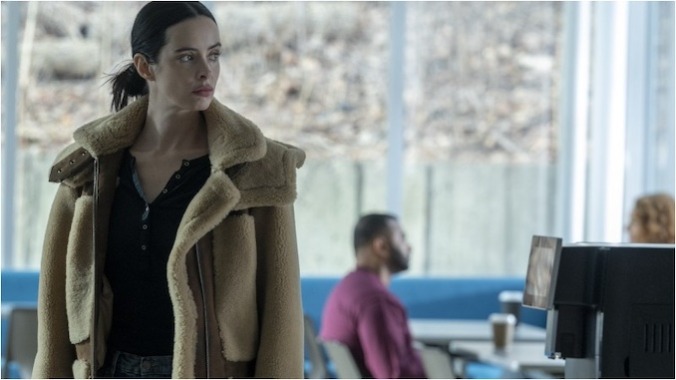Serviceable Sci-Fi Spinoff Orphan Black: Echoes Doesn’t Break Much New Ground
Photo Courtesy of AMC
The original Orphan Black was truly groundbreaking sci-fi television. Featuring an unbelievable performance from Emmy winner Tatiana Maslany, who played anywhere from four to eight characters in a given episode, the series was a taut conspiracy thriller that also explored themes of sisterhood, found family, and scientific ethics. It was addictive and felt genuinely fresh and unexpected in a television landscape that desperately needed more genre shows like it.
Now, seven years after the original series concluded, the spinoff series Orphan Black: Echoes arrives in a much different media environment. Prestige genre shows abound, from HBO’s House of the Dragon to Netflix’s The Witcher and AMC’s own Interview with the Vampire, and Tatiana Maslany has moved on to, if not bigger, at least greener things as She-Hulk in the Marvel Cinematic Universe. Elon Musk is out here trying to put chips in people’s brains. And in the wake of a global pandemic, the idea of vast medical and scientific conspiracies certainly doesn’t feel quite as far-fetched as it used to. Does a show like Orphan Black: Echoes still have something meaningful to say to today’s audience?
The answer to that question is a mixed bag. Part cautionary tale, part mystery series, and part tragic lesbian love story, it’s a show that has many excellent parts. But its pieces don’t entirely come together to form a satisfying whole. As television shows go, honestly, it’s fine, if generally unremarkable television. But fans of the original Orphan Black are likely going to be disappointed that it never quite manages to reach the heights of its predecessor.
As much a sequel as it is a spinoff, Echoes takes place in Boston in 2052, several decades after the end of the original. Echoes (pardon the pun) of the parent series abound in dialogue, in set dressing, and through several of the characters we meet. Thanks to the discovery of the LEDA clones, human cloning is now illegal everywhere, but that hasn’t stopped technology from advancing to the point where things like 4D printing of organs for transplants are possible.
This time around, the story follows Lucy (Krysten Ritter), a woman who wakes up disoriented in a random room unable to remember who she is. Confused and frightened, she demands answers from an unnamed doctor (Keeley Hawes) who’s hovering nearby, before discovering that she is a “printout,” an artificial person created using the same human-tissue-printing-method and copied from an existing (and unidentified) medical scan. After breaking out of the medical facility in which she’s being held, Lucy disappears, ultimately managing to build a life for herself in a rural community where she stays off the grid and finds a family in landlord Jack (Avan Jogia) and his deaf daughter Charlie (Zariella Langford).
But when her past comes back to haunt her—in the form of an unidentified thug trying to drag her back to the lab that made her—Lucy sets off on a journey to find out who she is, where she came from, and why she keeps having a disturbing nightmare about a younger version of herself covered in blood and holding a knife. Along the way, she discovers another printout, a moody teenager named Jules (Amanda Fix), who grew up thinking she was adopted after her parents died in a car crash, and the questions about who created this technology and what they’re trying to do with it intensify. Particularly when the pair are repeatedly brought back into the orbit of the scientist that Lucy met when she first woke up.
-

-

-

-

-

-

-

-

-

-

-

-

-

-

-

-

-

-

-

-

-

-

-

-

-

-

-

-

-

-

-

-

-

-

-

-

-

-

-

-








































